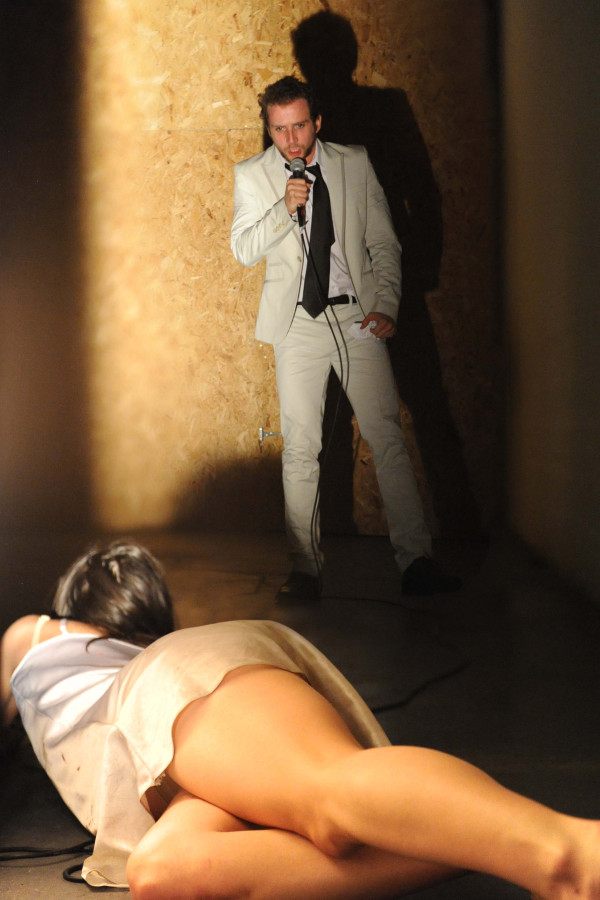Linda Christmas travelled to The Yard Theatre in Hackney to witness Liveartshow’s latest production – Rhinegold.
Since the premiere of Wagner’s Das Rheingold nearly 150 years ago, opera directors, music scholars and audiences have been singeing their brains in attempts to explain its meaning and that of the other three parts that form the Ring Cycle. How brave and bold then that the three talented men who form ‘Liveartshow’ should attempt a re-telling of ‘Rhinegold’. And re-tell it not in trendy Soho or Islington – where in the last couple of years we have been treated to a number of scaled-down and vamped-up operas – but in an empty warehouse, on an industrial estate etched with graffiti, positioned at the backside of the new Olympic stadium.
The unusual venue was the result of the talented three having such a success last year with Manga Sister, a dance opera. The Yard invited them to return but asked them to do an adaptation. Harry Blake, the composer, who had already re-modelled Don Giovanni (in Soho), chose Rhinegold. Director Martin Constantine and librettist Welshman Alan Harris chorused agreement.

Liveartshow
The Yard Theatre, Hackney
Their goal, Alan Harris said, was to concentrate on the Big Themes: the renunciation of love and people who get into a mess because they buy things they can’t pay for (spot on for today’s world). The guy who renounces love in Wagner’s version is the unattractive Alberich who fails to get a kiss from a bunch of Rhinemaidens (mermaids) and therefore quits kiss-chasing and falls instead for the lure of the power of gold hiding at the bottom on the Rhine. And the god Wotan builds a palace that he can’t pay for and offers his wife’s sister instead. This is hardly acceptable to the wife, not least because the sister holds the secret to eternal youth and without it they are doomed. The sister is held captive while a solution is found. That solution lies is stealing the gold from Albrecht. The new version also has a couple who order a house they can’t pay for and again, a sister is taken hostage … but this time the solution is to find not gold but a ‘golden voice’. In a tele-world teeming with vocal talent contests this might seem an acceptable echo of our times but in order to get ‘the voice’ Alberich cuts out a Rhinemaiden’s tongue. And swallows it. Ouch!
The result is a mesmerising 50 minutes of electronic music, dance, song and karaoke with several haunting moments. The first tongue-stealing episode is portrayed in an impressive dance sequence, choreographed by Jenni Fletcher and performed by Virginia Scudeletti; Alberich’s (Nick Figgis) pop-song rendition of Give up Love and Rule the World is a key theatrical moment and evening’s only operatic offering is Heather Burns as Erda, Wagner’s Earth Mother who tries unsuccessfully to warn Wotan against any further tongue-stealing.
And the music? The evening starts brilliantly with a long, low electronic rumble that captured Wagner’s opening sustained E flat (on double basses in the original) to signify the depths of the Rhine. After this the minimalist score offers only an occasional glimpse of the original, which you can’t expect a Wagner devotee to accept wholeheartedly, but nonetheless it suited this ‘re-telling’.
Alan Harris’ similarly minimalist libretto meant there were Wagner-style moments of bafflement when the new storyline offered unclear signifiers. Fortunately the stranger-in-the-next-seat (a young television producer) and I had complementary understanding and together, afterwards, we shared our clues until we more or less completed the crossword. Our chat, as well as being illuminating, was a glorious example of how much each member of an audience brings to a performance – hugging our cultural baggage, we see and interpret differently.
There are no plans as yet for Rhinegold to be seen in Wales, but there are fledgling plans for Manga Sister, the tale of an old man abandoned in a care home, to head west. Time Out considered this an eccentric gem: Rhinegold is eccentric but not quite a gem.










